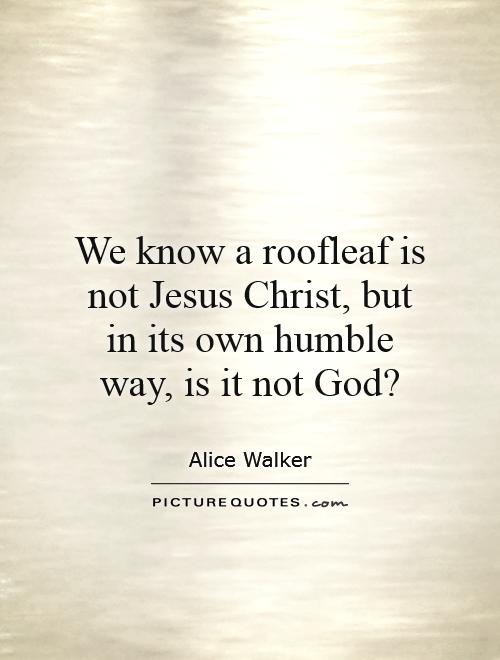We know a roofleaf is not Jesus Christ, but in its own humble way, is it not God?

We know a roofleaf is not Jesus Christ, but in its own humble way, is it not God?
Alice Walker, the renowned author of "The Color Purple," is known for her deep spiritual beliefs and her ability to find beauty and divinity in the most unexpected places. In her writing, she often explores the interconnectedness of all living beings and the presence of the divine in nature. This sentiment is beautifully captured in the quote, "We know a roofleaf is not Jesus Christ, but in its own humble way, is it not God?"In this statement, Walker is suggesting that even the smallest and most seemingly insignificant parts of the natural world can be imbued with a sense of the divine. A roofleaf, a simple and ordinary object, may not be a religious figure like Jesus Christ, but it still possesses a certain sacredness and beauty that reflects the presence of God. This idea is reminiscent of the concept of pantheism, which holds that God is present in all things and that the natural world is a manifestation of the divine.
For Walker, the roofleaf serves as a symbol of the interconnectedness of all living beings and the presence of God in the world around us. Just as Jesus Christ is seen as a representation of divine love and compassion, the roofleaf can be seen as a symbol of the beauty and wonder of creation. In this way, even the most ordinary and mundane objects can be seen as sacred and worthy of reverence.
Furthermore, Walker's statement challenges us to reconsider our understanding of God and divinity. Instead of viewing God as a distant and abstract figure, she invites us to see God in the everyday moments and objects that surround us. By recognizing the presence of the divine in the world around us, we can cultivate a deeper sense of gratitude, wonder, and connection to the natural world.












 Friendship Quotes
Friendship Quotes Love Quotes
Love Quotes Life Quotes
Life Quotes Funny Quotes
Funny Quotes Motivational Quotes
Motivational Quotes Inspirational Quotes
Inspirational Quotes